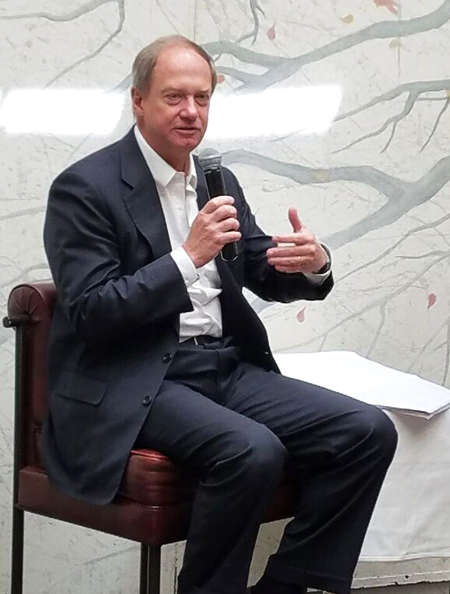
Ambassador John Emerson
After 12 years in power when she seemed untouchable in German politics, Chancellor Angela Merkel suddenly faces a real challenge from the new leader of the SDP party, Martin Schulz, according to John Emerson, the former US ambassador to Germany. Schulz stepped down from his position as President of the European Parliament to challenge Merkel in the upcoming elections in Germany in September, and he has transformed what looked like an easy reelection bid for Merkel into a very competitive race. Schulz has a very valuable common touch – “think Bill Clinton in terms of his ability to connect with working class people” Emerson told a roundtable lunch of LAWAC directors and International Circle members on April 18th. “Schulz is promising a lot of things – higher pensions, better benefits, more investment in schools…” And his message seems to be resounding with German voters. “It is not about Merkel or Schulz winning outright – it is about which party has a plurality can form a coalition,” predicted Emerson, who left his post in Berlin in January.
One notable effect of the rise of Schulz has been a corresponding decline in the popularity of the right-wing nationalist “Alternative fuer Deutschland” (AfD) party. Schulz has pulled support for them down from 13% to 8%.
Merkel has clearly suffered some damage to her image as a leader with her decision to open Germany’s borders to refugees and migrants from the Middle East in the summer of 2015, and her oft-repeated quote “Wir schaffen das” (‘We can handle this’). Flooded with over 1 million new migrants, Germany had to reverse course and reduce the flow of new arrivals, as right wing politicians assailed her for allowing criminals and terrorists to sneak in. Emerson, who got to know Merkel quite well during his posting in Berlin, said that she still doesn’t think she did the wrong thing by welcoming the migrants: “She was adamant that the country of ‘master genes’ [in the National Socialist era) was not going to put up camps for refugees in Bavaria.” But Emerson thinks that today she would probably say “not that she made a mistake, but that she should have done it a bit more carefully.”
However now that Germany has this extra 1 million, mostly Muslim, new population to deal with, they have been setting about methodically trying to integrate them – by getting them to learn to speak German, getting their kids into school and helping the adults find jobs. Germany is acutely aware of the problems of ghettos of non-integrated Muslims in France, Belgium and the UK that have bred entire generations of angry young men, some of whom have been lured into terrorist activities. “I received a lot of inquiries about how America has largely been successful in integrating our Muslim immigrants,” said Emerson. He said one of the main lessons is that “every element of integration requires equal commitment from the immigrant and from the host country” – if one side or the other chooses not to engage, the integration process will break down. One step that Germany is still struggling with is how to provide its immigrants with a clear path to citizenship, which is the capstone for integration of new immigrants to the US.
Emerson said that Germany has reacted “with a mix of horror and hurt” to the vote by the British to pull out of the EU. “Many Germans say ‘you don’t want to be a part of us – really?’” he said. And the prospect of Marine Le Pen winning in France and pulling her country out of the EU is even more worrying to Germans. “Germany likes being part of a bigger organization – going it alone in the twentieth century didn’t work out well.”
The other main foreign policy concern in Germany is the increasing boldness of Russian President Vladimir Putin in his interference in European politics. Merkel has led the efforts in Europe to impose sanctions on Russia for the invasion of Ukraine. But with elections looming in September, Germany is bracing for Russian hackers who are expected to play havoc with fake news websites and other stratagems designed to discredit the electoral process or even influence the outcome.
